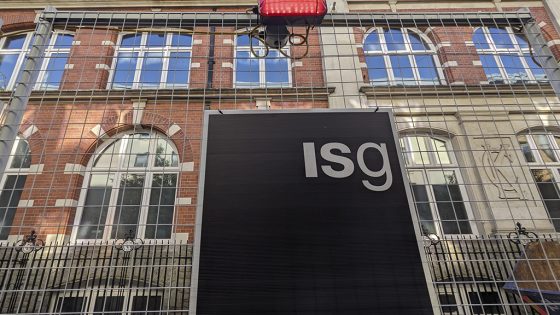ISG chief executive Zoe Price has apologised to staff and suppliers and said the company has filed for administration due to loss-making contracts signed before the Covid pandemic.
In a Thursday evening (20 September) email sent to almost 3,000 employees, Price said that the group’s “trading and cash performance has been impacted by legacy issues relating to the large loss-making contracts secured between 2018 and 2020”.
The executive did not say how many problem jobs combined to sink ISG, but said they were “primarily” in the residential and logistics and distribution sectors, alongside “some” data centre projects.
“Trading out these projects has had a significant effect on our liquidity. So even though we have been profitable this year, our legacy has led us to a point where we have been unable to continue trading,” she said.
Price, who became ISG chief executive in February after 12 years as company director, said it was “with sadness” that she confirmed the collapse, adding: “I am so sorry to have to share this news.”
In a separate email Price also apologised to suppliers, saying “we’re sorry to have to confirm this news” – but warned them: “Please do not make any attempt to gain access [to ISG sites] as this will be denied.”
Price told subcontractors they will be able to collect plant, materials and tools once arrangements are made by an administrator, while employees were informed they will be paid in full on Monday (24 September).
Price said that ISG’s owner Cathexis – backed by Texan billionaire William Harrison – “looked at refinancing the company in recent months but has been unable to execute”.
Price also said that “there have been significant efforts made to secure a sale of the group over many months” but that these fell short as “the purchaser could not satisfy the funding needed to recapitalise the business”.
However, that has been disputed by Andre Rudiger, founder of would-be buyer Antipodean Holdings, who told Construction News that his company was “ready to strike a deal that would have secured the company’s future”.
Build UK, which represents specialist contractors and has ISG as a member, said it was “another challenging day for construction”.
“ISG entering administration will be felt by almost 3,000 employees and throughout the supply chain, which is already under significant pressure. There will also be a significant impact on those just starting out on their career in construction,” it said.
The trade body added that the high rate of construction insolvencies raises “serious questions about the industry’s business model”.
“For too long, inappropriate transfer of risk and unsustainable profit margins have been accepted as the way to do business, despite the recommendations for more collaborative and sustainable ways of working featured in every report since Latham,” it added.
Robert Sanders, chief financial officer at Structura, described the announcement as “awful” for the industry.
The firm, a curtainwall engineering contractor, had already significantly reduced its work with ISG due to concerns about its future and had only one job in progress. He warned other specialists had more exposure and could be hit hard.
“There are going to be a lot of subcontractors owed a lot of money. I really feel for them,” he said.
National Access & Scaffolding Confederation chief executive Clive Dickin said: “The collapse of ISG represents not only a financial blow to subcontractors but also a logistical nightmare for scaffolding companies who now face weeks of uncertainty over the fate of their equipment and contracts.”

